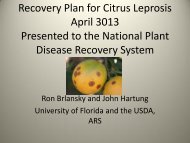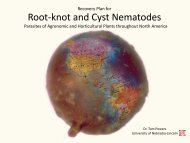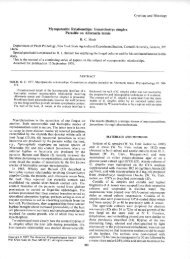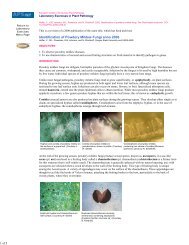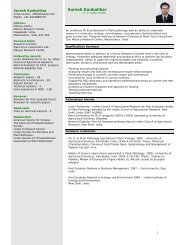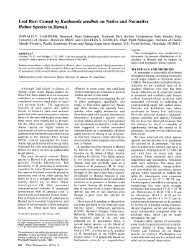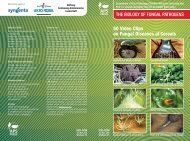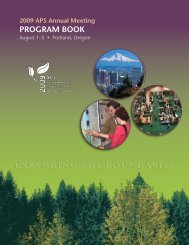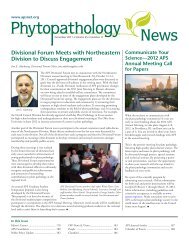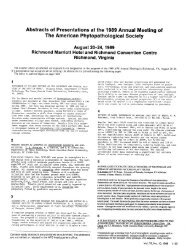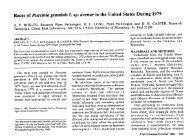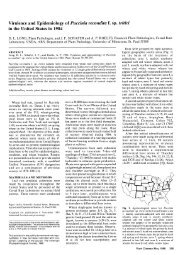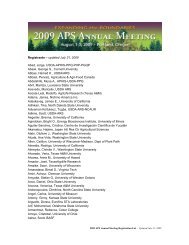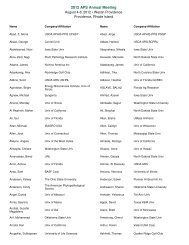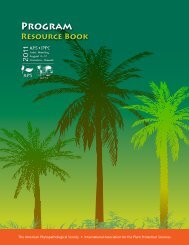See the program book (PDF) - American Phytopathological Society
See the program book (PDF) - American Phytopathological Society
See the program book (PDF) - American Phytopathological Society
Create successful ePaper yourself
Turn your PDF publications into a flip-book with our unique Google optimized e-Paper software.
Centennial Sessions<br />
100 Years of The <strong>American</strong> <strong>Phytopathological</strong> <strong>Society</strong><br />
Sunday, July 27 • 3:15 – 5:45 p.m. • Auditorium<br />
Over <strong>the</strong> past 100 years, APS has grown into a relevant and<br />
responsive leader in <strong>the</strong> field of plant pathology and has<br />
remained that way through a commitment to high standards<br />
and revolutionary leaders. Speakers will address <strong>the</strong> evolution<br />
of APS as a professional scientific society; <strong>the</strong> growth of<br />
APS as a publisher of journals and <strong>book</strong>s; <strong>the</strong> role of APS in<br />
public service and education; APS leadership/cooperation in<br />
international agriculture and <strong>program</strong>s; and APS leadership in<br />
plant pathology within <strong>the</strong> life sciences.<br />
Plant Pathology in 1908/2008<br />
Monday, July 28 • 8:00 – 9:00 a.m. • 200 DE<br />
Plant pathology has come a long way in <strong>the</strong> century since APS<br />
was founded. Presentations from 1908 on phytobacteriology<br />
and chestnut blight will be followed by 2008 updates on<br />
<strong>the</strong>se two topics to illustrate <strong>the</strong> progress of our science in<br />
<strong>the</strong> last 100 years. All speakers will be plant pathologists and<br />
presentations will be in 1908 costumes and with lantern slides!<br />
Optimizing Opportunities for Everyone in Plant Pathology<br />
Monday, July 28 • 3:15 – 6:15 p.m. • Auditorium<br />
It is more important than ever for our discipline to ensure<br />
opportunities for everyone and APS is taking steps to ensure<br />
that diversity is both valued and rewarded. Be a part of <strong>the</strong><br />
discussion as well-known speakers address <strong>the</strong> history of<br />
women in plant pathology; how <strong>the</strong> quality of science benefits<br />
from diversity; and <strong>the</strong> impact of international scientists on<br />
scientific productivity.<br />
The Future of Plant Pathology<br />
Tuesday, July 29 • 2:45 – 5:45 p.m. • Auditorium<br />
The field of plant pathology is pushing forward with new and<br />
exciting technologies and applications. Powerful genomics<br />
and bioinformatics tools are enabling researchers to examine<br />
interactions among entire microbial communities, and new<br />
high-power computing capabilities are mining and comparing<br />
genomes and proteomes of plant pathogens and <strong>the</strong>ir hosts.<br />
CentenniAl PROgRAM<br />
APS is proud to offer many special activities at this year’s annual meeting<br />
in honor of our Centennial.<br />
Remote-sensing devices are being used to monitor plant<br />
disease epidemics across a wide range of temporal and spatial<br />
scales, and online databases are linking living plant pathogen<br />
culture collections to publicly available morphological and<br />
sequence data. Global food markets are demanding a reliable<br />
production of safe food and feed, and regulatory networks<br />
are poised to rapidly detect and respond to immediate threats<br />
of high-risk plant pathogens. A new “wired” generation of<br />
students needs to be engaged in <strong>the</strong> classroom. Attracting and<br />
retaining <strong>the</strong>se individuals as agricultural professionals is a<br />
crucial discussion that must be explored in order to ensure <strong>the</strong><br />
future of our discipline.<br />
Centennial displays<br />
Historical Displays • Main Lobby, Convention Center<br />
Stop by and examine <strong>the</strong> antique tools of our discipline in<br />
this special historical display. <strong>See</strong> evidence of <strong>the</strong> evolution<br />
of our scientific journals that have been such an important<br />
and prominent part of <strong>the</strong> history of APS and our discipline.<br />
Reminisce while you view <strong>the</strong> antique instruments in this<br />
exhibit. In addition to <strong>the</strong> historic instruments that you may<br />
or may not recognize in <strong>the</strong> display, <strong>the</strong>re is a collection of<br />
mystery tools that will challenge your imagination. Take <strong>the</strong><br />
challenge and see how many of <strong>the</strong> mystery items you can<br />
identify! Stop at <strong>the</strong> APS PRESS area in Exhibit Hall C for<br />
a look at “APS T-shirts Through Time” Centennial display<br />
featuring a full collection of past APS Annual Meeting<br />
T-shirts.<br />
Centennial Timeline • Main Lobby, Convention Center<br />
This incredible timeline of major discoveries, pioneers,<br />
epidemics, and historic events in <strong>the</strong> evolution of APS is not<br />
to be missed! Many members have taken time to remember<br />
<strong>the</strong> unique milestones and major events that have helped<br />
to shape APS and its impact on plant pathology, making<br />
this timeline both a personal account of our history and an<br />
important indicator of how key discoveries led to <strong>the</strong> work<br />
we are doing today. The timeline provides a sense of pride<br />
and accomplishment for all society members and is especially<br />
informative for younger members and students.<br />
15



